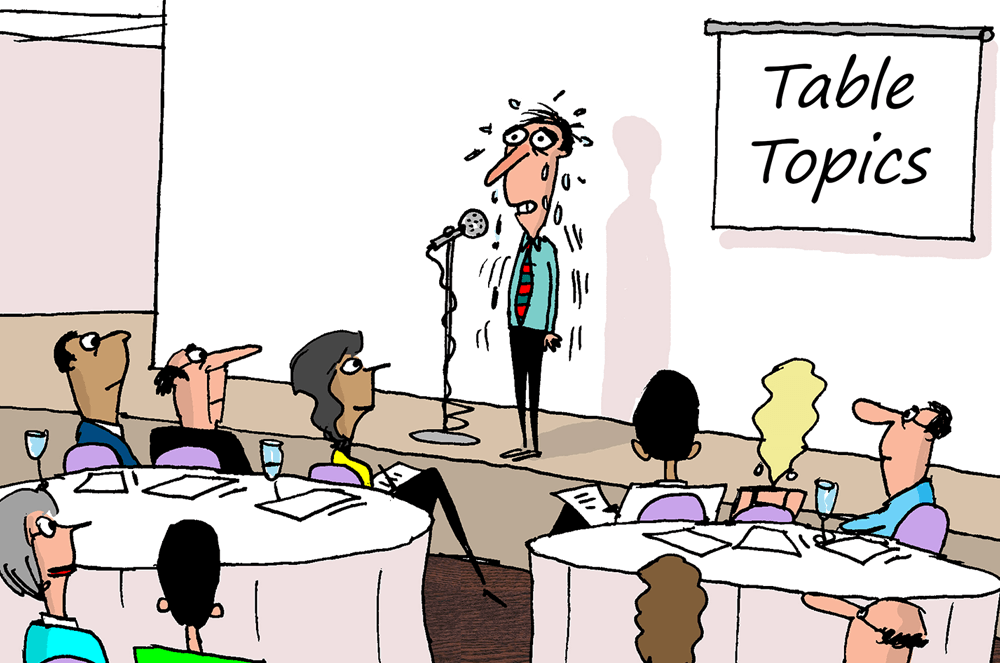
Over the past 11 years I have written articles on topics ranging from speechwriting to team building in the Toastmaster magazine. As a longtime member, I enjoy writing about topics that are helpful to Toastmasters, especially the newer members.
Our plan, starting with this article, is to address some of those questions. So, if you are struggling with something Toastmasters related, email your questions to magazine@toastmasters.org. We will answer as many as we can through this new column: The Answer Man.
For now, I’ve chosen a couple of recent questions posted in The Official Toastmasters International Members Group on Facebook, both centered on Table Topics.
What are some ways a new member can come up with Table Topics questions, particularly for a themed meeting?
–Angela Lee, DTM
New York City
This, obviously, is the key skill in being a Table Topicsmaster. Hopefully, you know at least something about the selected theme. If not, a search engine is your friend. This should give you more than enough information to prepare.
While some people like to write questions that require speakers to be creative, I like to give them questions that are easy to answer. I want to help them practice and improve their confidence in answering questions.
Here are some examples of questions I have asked. “Do you like the time change? Why or why not?” “Tell us about your favorite driving-in-the-snow adventure.” During a club meeting with the theme Putting Your Best Foot Forward, I asked, “How would you encourage a brand-new member of our club to put their best foot forward in their speaking projects?”
One of the benefits of these types of questions is that you get to know something about the other members, especially if you are a new member. It can help you feel more comfortable and like less of a newbie or stranger.
Should the Table Topicsmaster call on people at random or should the Topicsmaster ask for volunteers?
–Regina Litman, DTM
Huntingdon Valley, Pennsylvania
There are different approaches, and all are effective, but the one I like is “C: None of the above.”
The policy I prefer is that everyone should get a chance to speak at every meeting. My experience is that when the Table Topicsmaster calls on people at random, they tend to call on people they want to hear speak. These are usually people who already do a good job at Table Topics and may not need the practice as much as others do.
As to volunteers—it seems that those who need the practice rarely volunteer.
The method I use is as follows: When I receive the meeting agenda, I make three columns. The first is a list of those who do not have a meeting role. The second is for those with minor roles, such as the timer, Ah-Counter, or grammarian. The third column is for those who have a major role. This includes the Toastmaster of the Day, the speakers, the General Evaluator, and the speech evaluators.
When I am the Table Topicsmaster, I call on members listed in the first column; that way, if there are any members who don’t have a role, everyone gets their turn onstage. When I have finished that column, I go to the second one, thus giving those with minor roles more stage time. Finally, if there is time remaining, I tackle the third column.
As an exception to that rule, sometimes there is someone who desperately needs to improve their impromptu skills. I might ask them a question, even if they have a key role.
I hope these tips are useful, and that you’ll find many more in this column as we go forward. Don’t be afraid to ask your questions. If you are stumped about something, chances are, others are too.
If nothing else, look at it as asking me a Table Topics question. Just don’t ask me to volunteer.
EDITOR’S NOTE: If you have a question for The Answer Man, email it to magazine@toastmasters.org for a chance to be featured in an upcoming column.
Questions are occasionally edited for clarity and brevity.
Bill Brown, DTM is a speech delivery coach in Gillette, Wyoming. He is a member of Energy Capital Toastmasters in Gillette. Learn more at billbrownspeechcoach.com.
Related Articles

Goal Setting
Are Your Goals Achievable?

Club Experience
The Two Sides of Table Topics

Table Topics



 Previous
Previous

 Previous Article
Previous Article